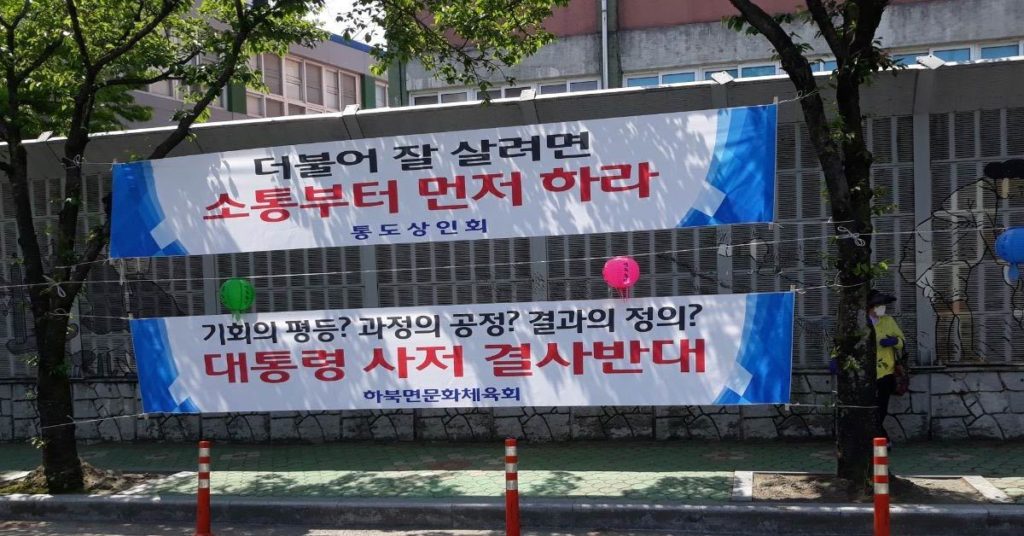The future neighbors of President Moon Jae-in’s post-retirement private residence are now against him moving into their neighborhood. They welcomed Moon when the news first broke in June, but their attitudes have now changed completely.
Residents of Yangsan, South Gyeongsang, hung banners around the neighborhood that read, “Construction of the residence without reflecting local residents’ opinion should be completely invalid,” “There can be no president without people, there can be no residence without people’s consent,” and “Stop the construction of a residence that destroys peaceful daily life.” According to civic groups representing the local residents, around 37 banners were installed on April 21, but 30 of them were removed within a day. Civic groups asked the police to investigate who removed the banners.
“President Moon Jae-in says he will live a quiet life in Habook-myeon [in Yangsan] after his retirement, but as you can see in the case of Kimhae Bongha Village where late President Roh Moo-hyun’s residence is located, local residents will experience inconvenience due to various reasons, such as a large number of people visiting the residence,” Chung Yong-goo, the head of the Habook village association, told domestic media outlets. “The Blue House is trying to push ahead with the plan without communicating with the residents.”
According to Chung and other local civic groups, the Blue House’s security department held a briefing to inform people about the construction of facilities for Moon’s bodyguards on April 8, but only 10 residents participated in the event.
The construction began earlier this month. The facilities for Moon’s security are expected to be completed by the end of this year, and the private residence is due to be completed in March next year.

This is not the first time that President Moon’s post-retirement residence has faced controversy.
Moon bought a two-story house with 3,860 square meters of land in Yangsan, including farmland, in April last year, and plans to live there after retirement. It was reported that the total price was around 1.47 billion won ($1.32 million).
Among the land he purchased, 1,871 square meters is designated as farmland. He purchased it at 593 million won ($531,000), or 317,205 won per square meter. The average trading price in the region was around 530,000 won per square meter. Farmland is cheaper than land used for residential purposes, and some speculated that the first couple potentially profited from the land purchase.
It was later found out that local authorities changed the land use of the farmland to residential on January 20 this year. It just took nine months to change the land use, and domestic farmer groups criticized that it would not have been easy to get government permission to change the authorized use for an ordinary person.
Under Korean agriculture law, only those who actually farm can own farmland. An exception in the law allows anyone to possess farmland if they submit a farming plan and related documents and then implement the plan.
Moon’s written certificate of farmland ownership qualifications submitted to local authorities in Yangsan at the time of his purchase was also released by a lawmaker from the main opposition People Power Party (PPP). Moon wrote that he had 11 years of farming experience at his residence at Yangsan and his wife, Kim Jung-sook, had zero years of agricultural experience. According to the certificate, Moon bought the land to plant fruit trees.
On March 12, a day after the media broke the stories about the president’s land purchase, Moon expressed his anger on Twitter about the issue being raised.
“Now is an election season, so I understand, but that is enough. It is small-minded and cringeworthy [of the opposition party to take issue with the residence] … I can only live on the land but cannot dispose of it because it will have accessory facilities for presidential security…We are taking all the procedures lawfully.”
At the time, the news that employees of the state-run Korea Land and Housing Corp. speculated on farmland through the same exception in the farmland ownership qualification clause brought out anger among people. This was the clause that allowed Moon to buy the farmland.
“He purchased farmland, which is relatively less expensive, by arguing that he will farm, but changed the use of the land within a year from the purchase,” said Yoon Young-seok, a lawmaker from the main opposition People Power Party (PPP), who acquired and released the official documents related to the Moon’s land purchases. “How is it different from Korean Land and Housing employees’ speculation methods that bought land in newly developing cities through fake certification documents?”
Statements released by the Blue House continued to fuel the controversy. “Moon took care of his farmland in his spare time and whenever he returns to his [current] residence [in Yangsan],” it said. If the statement was correct, Moon farmed when he was a lawmaker, when he was the leader of an opposition party, and even as the president of South Korea, the PPP pointed out. Also, there was barely any news about the Moon family visiting the farmland, which is more than four hours by car from Seoul. When asked how many times they visited and were involved in farming, the Blue House repeatedly responded that their private schedules are top secret.


